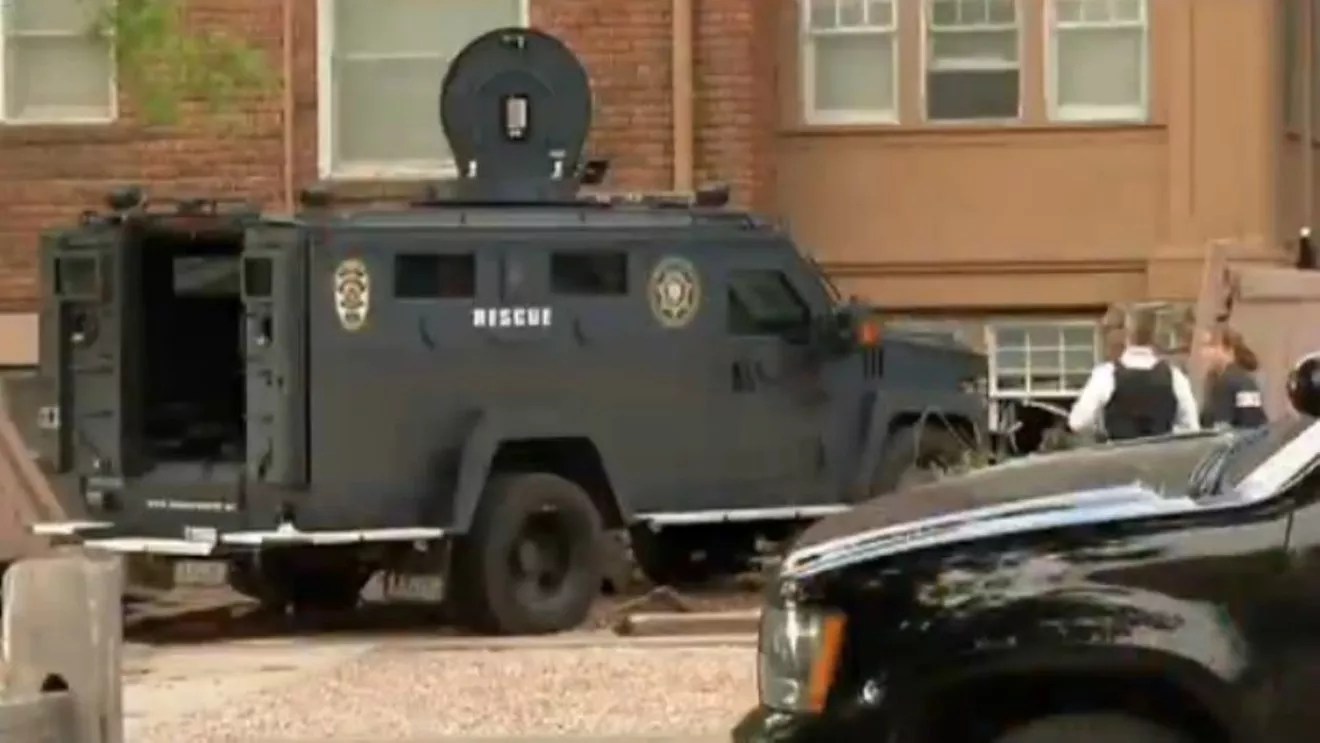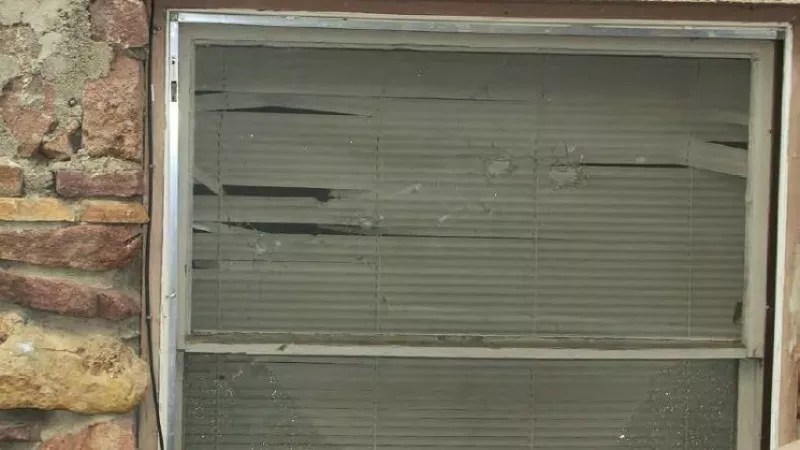
Denver7 via YouTube

Audio By Carbonatix
Boulder City Council has agreed to pay $1.3 million to Coleman Stewart over an incident during which he was shot by Boulder Police Department officers in 2014.
This payout isn’t isolated; it’s at least the fifth related to the BPD that the City of Boulder has settled during the past two years, with the total cost exceeding $4 million. But the incident, which escalated from a beef over less than $5 in cab fare to a SWAT team standoff involving an armored police vehicle, took the longest to reach a resolution – more than eight years – in part because prosecutors spent so much time pursuing criminal charges against Stewart, who was initially convicted before being essentially exonerated on appeal. And even after his case was dismissed, Boulder authorities continued to portray the officers as victims rather than victimizers.
As part of their deal, the City of Boulder and attorney Elizabeth Wang of the Boulder-based law firm Loevy & Loevy, which filed a civil lawsuit on Stewart’s behalf, issued a joint statement about the matter’s end. “The City of Boulder and Coleman Stewart have entered into a settlement agreement that resolves the issues presented in the lawsuit Mr. Stewart filed in federal court against the City and several current and former Boulder police officers, Stewart v. City of Boulder,” it states. “The $1.3 million settlement is a compromise of disputed claims, and each party hopes the other will benefit from the closure the settlement will provide.”
“I’m happy for Cole and his family that he was able to get a settlement on the civil suit on the basis that he was wronged – and he was,” says Iris Eytan, a lawyer with Denver’s Eytan Nielsen, who defended Stewart in the appeal of his criminal conviction.
The police summary of what went down early on May 30, 2014, is simple and straightforward. According to the department, officers were called to Stewart’s apartment building, in Boulder’s University Hill neighborhood, after a cab driver maintained that he hadn’t paid his fare. Shortly thereafter, Stewart, then 23, is said to have brandished a weapon, prompting a trio of cops – Nicholas Frankenreiter, Jacob Vaporis and Erin Starks – to open fire. Only after Stewart had been hit twice, in his arm and knee, did they discover that the weapon in question was a BB gun.
The jury that heard these details bought the police version of events, convicting Stewart in February 2015 on four felony menacing counts, as well as misdemeanor obstruction of a police officer. His sentence: 45 days in jail, plus $15,000 to cover damage to the fence and his apartment caused by a police vehicle called a BearCat, which was deployed by officers after he took refuge in his apartment.
In July 2017, however, the Colorado Court of Appeals reversed Stewart’s convictions and called for a new trial. And a 2018 motion to dismiss filed by Eytan, who took up the appeal after Stewart moved on from his previous lawyers, told a very different tale.
According to her filing, when Stewart didn’t immediately hand over his taxi fare, which came to a grand total of $4.85, the cabbie “drove crazily away from Cole’s apartment after refusing to let him out; with tires screeching, horn honking and passenger door open, he made a hard right turn onto 13th Street and stopped the wrong way in front of a bank ATM near the University Hill police annex.” At that point, Stewart jumped out of the cab and ran, in part because he feared the driver was kidnapping him. The motion says the cabbie was worried about that, too, but an officer reassured him that he was “good.”

A Boulder police photo of the bullet-riddled living-room window of Cole Stewart’s apartment as shared in the motion to dismiss the charges against him.
After that, the motion continues, officers “outrageously violated the Fourth Amendment…by hopping Cole’s six-foot privacy fence and appearing with guns drawn in his patio curtilage. From this unlawful perch, officers fired a volley of ten gunshots, eight of which made it into Cole’s apartment and two of which struck Cole. Cole laid inside for two hours while a BearCat demolished the privacy fence and the front door until the officers dragged him outside bloodied and unconscious of what had happened.”
As for the BB gun, Eytan said it was lying on a windowsill and acknowledged that Stewart might have grabbed it out of fright at some point. Officers Frankenreiter, Vaporis and Starks, joined at the scene by fellow Boulder cops Andrew Kirshbaum and Ronald Perea, all maintained that he’d actually aimed the weapon at them in a threatening fashion. But a criminologist later concluded that from their angle, the cops couldn’t possibly have seen Stewart aiming the gun at them.
This suggested that the officers had committed perjury, Eytan maintained. But before she could make that argument in court, the Boulder District Attorney’s Office raised the white flag – though its 2018 motion requesting that the case be tossed didn’t acknowledge any mistakes on the part of law enforcement. Instead, prosecutors contended that trying to prove the original accusations against Stewart would be “unnecessarily cumulative. … The victims [the officers] understand that the defendant has attempted to paint them in the worst possible light, playing on popular themes and fears relating to law enforcement,” but they “maintain they wish to move beyond this incident and not be forced to reopen those traumatic memories in step-by-step detail once again.”
The DA’s office document added: “The victims agree that a retrial of the case would constitute a pyrrhic victory at best, as the defendant has already completed almost the totality of the sentence imposed.”
“The case against Cole was dismissed twice, and he was found innocent twice,” Eytan points out. “But that didn’t erase the damage it caused Cole and his family after he was shot by police, along with all the other inaccuracies that were said about him. His soul was shattered as a result of what happened.”
That led to his decision to sue in 2019. In the years that followed, he voluntarily dismissed claims against “all current and former individual Boulder police officers, leaving the City of Boulder as the sole remaining named defendant in the action,” the settlement states. The agreement also includes the following non-disparagement clause: “The City of Boulder and any of its agents or employees will not disparage Mr. Stewart or make any statement which could reasonably be expected to adversely affect his personal or professional reputation. Similarly, Mr. Stewart will not disparage the City of Boulder or any of its agents or employees or otherwise make any statement which could reasonably be expected to adversely affect the personal or professional reputation of the City of Boulder or any of its agents or employees. This provision shall not apply to statements made in response to a subpoena or lawful court order.”
That language prevents parties from weighing in on the issue of whether the Boulder Police Department’s actions toward Stewart constitute a pattern and practice of behavior related to excessive force. But there are patterns in Boulder’s payouts: Other settlements since 2020 include $125,000 to Zayd Atkinson, $95,000 to Sammie Lawrence, $875,000 to Christopher Mahan, and $2 million to the family of the late Seth Franco.
Click to read the Colorado v. Coleman Stewart motion to dismiss, a review and analysis of evidence in the criminal case, and the settlement agreement.